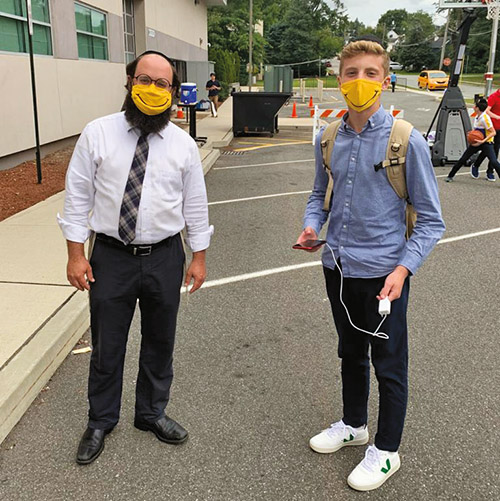


Ask a student at TABC who he ate lunch with that day and his answer may surprise you. Sure, many days it’s a friend or classmate (six feet apart, of course), but just as often it’s his rebbe or teacher, or this year, someone he may have never encountered in the classroom at all. That’s because this year, TABC’s new mechanech initiative is here. Under the guidance of TABC’s Dean of Students Rabbi Gary Beitler, TABC mechanchim serve as the first points of contact for students and as direct liaisons to the guidance department and administration. More succinctly, the mechanchim are one of the many people at TABC simply looking out for the students.
“One of the things that struck me when I first came to TABC was how central the rebbe-talmid relationship is to the TABC culture,” said Rabbi Shlomo Adelman, TABC’s head of school. “I thought, why not create more of these relationships throughout the building?”
That’s where the mechanchim come in. The mechanchim—Rabbi Michael Hoenig, (ninth, Rabbi Jake Berman, 10th, Rabbi Jonathan Kessel, 11th, and Rabbi Dovid Einhorn, 12th—proactively meet with students one-on-one at least once, more often twice, per semester. These meetings can be over lunch, a one-one-one basketball shootout in the gym, or just a laidback chat in the Storm Cafe. If a student is out sick or in quarantine (a unique issue to this school year, no doubt), the mechanech will stop by for a quick visit outside (and more often than not, he brings a doughnut). Mechanchim also meet with their respective grades as a group before chagim for a gradewide program or a shiur, attend the grade’s trips off-campus, like snow tubing and kayaking, and give weekly chaburot (bagels included).
“The truth is, most of the time, it’s not anything formal or planned,” Rabbi Kessel said. “The key is finding those opportunities to connect organically and meet the student where he is.”
The mechanchim meet weekly as a group with Rabbi Beitler, who often arranges for guest speakers (via Zoom) to speak on a wide range of topics relating to connecting with students.
“Rabbi Yosef Sonnenschein recently spoke to us about being real in our interactions with students and some useful tools to make sure our best intentions come through,” Rabbi Beitler said. “It resonated. We see every day in our classrooms how smart our students are. It’s important not to underestimate them outside the classroom.”
The mechanchim also meet regularly with the guidance department to discuss any issues that may arise. This partnership ensures that no student falls through the cracks. At these meetings, guidance counselors, mechanchim, and the administration, when necessary, can decide together how to approach a potential issue.
Rabbi Adelman is thrilled with the success of the program so far—and especially during such a challenging year where it’s more difficult to connect in traditional ways.
“Our goal at TABC is not just to teach our students, but to reach them,” Rabbi Adelman said. “The mechanchim have done an extraordinary job of bringing that vision to life.”










